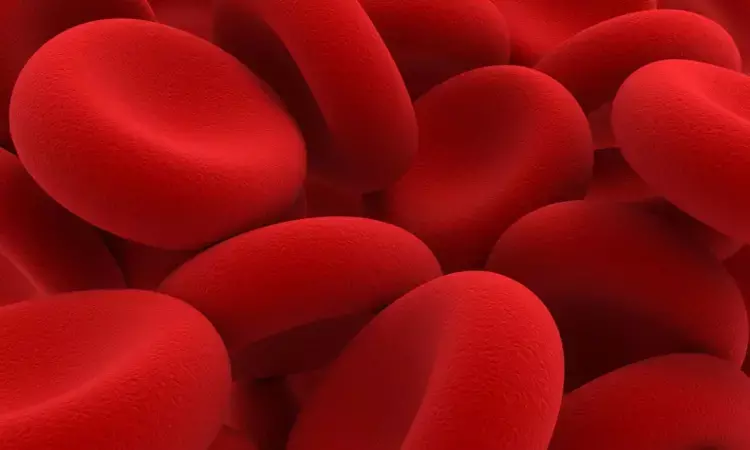- Home
- Medical news & Guidelines
- Anesthesiology
- Cardiology and CTVS
- Critical Care
- Dentistry
- Dermatology
- Diabetes and Endocrinology
- ENT
- Gastroenterology
- Medicine
- Nephrology
- Neurology
- Obstretics-Gynaecology
- Oncology
- Ophthalmology
- Orthopaedics
- Pediatrics-Neonatology
- Psychiatry
- Pulmonology
- Radiology
- Surgery
- Urology
- Laboratory Medicine
- Diet
- Nursing
- Paramedical
- Physiotherapy
- Health news
- Fact Check
- Bone Health Fact Check
- Brain Health Fact Check
- Cancer Related Fact Check
- Child Care Fact Check
- Dental and oral health fact check
- Diabetes and metabolic health fact check
- Diet and Nutrition Fact Check
- Eye and ENT Care Fact Check
- Fitness fact check
- Gut health fact check
- Heart health fact check
- Kidney health fact check
- Medical education fact check
- Men's health fact check
- Respiratory fact check
- Skin and hair care fact check
- Vaccine and Immunization fact check
- Women's health fact check
- AYUSH
- State News
- Andaman and Nicobar Islands
- Andhra Pradesh
- Arunachal Pradesh
- Assam
- Bihar
- Chandigarh
- Chattisgarh
- Dadra and Nagar Haveli
- Daman and Diu
- Delhi
- Goa
- Gujarat
- Haryana
- Himachal Pradesh
- Jammu & Kashmir
- Jharkhand
- Karnataka
- Kerala
- Ladakh
- Lakshadweep
- Madhya Pradesh
- Maharashtra
- Manipur
- Meghalaya
- Mizoram
- Nagaland
- Odisha
- Puducherry
- Punjab
- Rajasthan
- Sikkim
- Tamil Nadu
- Telangana
- Tripura
- Uttar Pradesh
- Uttrakhand
- West Bengal
- Medical Education
- Industry
Iron deficiency common and tied to adverse outcomes in patients with HF with reduced EF: Study

India: A recent study published in Cureus has shed light on iron deficiency, a silent threat in patients with heart failure with reduced ejection fraction (HFrEF).
The study of nearly 400 patients in India showed that more than half of patients with HFrEF and three-quarters of patients with iron deficiency exhibited anemia, demonstrating a significant association between iron deficiency and anemia in heart failure (HF).
"Iron deficiency emerges more than a mere comorbidity in HF, becoming a prognostic factor with multifaceted outcomes," the researchers wrote. Its impact extends beyond cardiovascular consequences, including adverse manifestations such as ascites, anemia, dyspnea, edema, a heightened risk of mortality, and elevated jugular venous pressure (JVP).
Previous studies have shown iron deficiency as a clinically significant and prevalent comorbidity in HFrEF patients. Despite its high prevalence, its impact on mortality, clinical outcomes, and several physiological parameters remains a topic of ongoing investigation. The study findings are anticipated to contribute valuable insights into the prognosis and management of HFrEF patients, potentially informing future interventions and improving patient outcomes.
Against the above background, Nitin Sarate, Seth Gordhandas Sunderdas Medical College, and King Edward Memorial Hospital, Mumbai, India, and colleagues aimed to assess the clinical profile of iron deficiency and its implications on mortality and morbidity in patients with HFrEF.
For this purpose, the researchers conducted a prospective cohort study at King Edward Memorial Hospital, India, comprising 371 patients with HFrEF. Participants underwent comprehensive laboratory and clinical assessments, evaluating iron deficiency with symptoms, signs, dyspnea, comorbidities, elevated JVP, past medical history, and various biochemical and hematological parameters.
Based on the study, the researchers reported the following findings:
- 50% of HFrEF participants were iron deficient, of whom 80% had anemia against 43% anemics in iron repletes (n = 186).
- Of the 185 iron-deficient patients, 11.86% had absolute iron deficiency, and 38% had functional iron deficiency.
- Iron deficiency significantly correlated with increased mortality in HFrEF patients.
- A large positive correlation was observed between absolute iron deficiency and dyspnea severity (r2 = 0.949).
- Statistically significant differences were found in hemoglobin (anemia), serum ferritin, serum iron, total iron-binding capacity, and transferrin saturation between iron-deficient and iron-replete patients. However, there was no statistically significant difference in left ventricular ejection fraction between iron-deficient and replete patients.
In conclusion, the current literature stresses the adverse impact of iron deficiency on health-related QoL, exercise capacity, and mortality in patients with heart failure, prompting interest in interventions to correct iron deficiency.
"Nevertheless, further research will be crucial to refine strategies for optimal identification and management of iron deficiency in HFrEF patients, elucidating the intricate mechanisms that underlie its association with adverse outcomes in this population," the research team wrote.
Reference:
Sarate N, Sonawane R, Pai V, Karatela S, Mulkalwar A. Iron Deficiency: A Silent Threat in Patients With Heart Failure With Reduced Ejection Fraction. Cureus. 2024 Feb 4;16(2):e53542. doi: 10.7759/cureus.53542. PMID: 38445122; PMCID: PMC10912968.
Dr Kamal Kant Kohli-MBBS, DTCD- a chest specialist with more than 30 years of practice and a flair for writing clinical articles, Dr Kamal Kant Kohli joined Medical Dialogues as a Chief Editor of Medical News. Besides writing articles, as an editor, he proofreads and verifies all the medical content published on Medical Dialogues including those coming from journals, studies,medical conferences,guidelines etc. Email: drkohli@medicaldialogues.in. Contact no. 011-43720751


